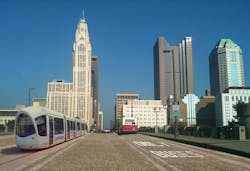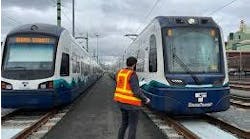To the surprise of those outside Columbus, the U.S. Department of Transportation (US DOT) announced the Ohio capital as the Smart City Challenge winner and presented city officials with $40 million in late June. The competition that asked local governments to envision how their city could fuse transportation systems and technology in new, meaningful ways drew in 78 applications from all over the country — with Columbus being the only finalist city without a dedicated rail service already in existence. In addition to the $40 million from the US DOT and $10 million from Vulcan Inc., Columbus officials secured an additional $90 million committed through public-private partnerships if they won the grant. The win comes at a pivotal time for the Midwest city as the latest growth projections show the automobile-dependent Columbus region will add one million people by the year 2050.
Why Columbus?
Looking at the past six decades, Columbus stands out as having resisted Ohio’s relative population decline. It’s also the only major city in the state that is growing — and at an impressive rate no less. In contrast to the population growth the city is currently experiencing, the city saw the loss of an Amtrak service and streetcar system decades ago; these mass transit options were replaced with highway and urban “renewal” projects. Currently, Columbus became known as the largest metro area without access to passenger rail and even lost the bid to host both the Republican and Democratic National Conventions for reasons including the city’s public transportation deficiencies.
The Smart City grant proposal and ultimate win is part of a longer narrative that stretches back to 2010. That is the year Columbus adopted a new master plan for downtown, and Columbus 2020, the economic development agency, was also launched to strengthen and diversify the Columbus economic base with 150,000 additional jobs, $8 billion in capital investment, and a 30 percent raise in personal per capita income by 2020. Finally, in preparation for the city’s bicentennial in 2012, the Columbus community as a whole began asking itself: what kind of city is Columbus?
These series of events sparked a new chapter of community dialogue around transportation policy that advocates for investments to create a more equitable, multi-modal transportation system. To answer the call, several initiatives were launched including Forge Ahead by Forge Columbus. The Forge Ahead initiative was born in 2013 as a grassroots effort that snowballed into a major three-year undertaking. The 88-page transportation study takes a totally unique approach to planning — by assembling a variety of diverse partnerships and gathering more than 13,000 engagements via a crowdsourcing platform, creating the largest participatory transit plan in the nation. The report tapped into a wide-ranging set of partnerships such as Transit Columbus, the Create Columbus Commission, The Ohio State University, the Columbus Museum of Art and everyday citizen experts and focuses on ways to not only help increase accessibility, but also reduce urban sprawl, shrink the city’s carbon footprint, and aid economic growth with the latest transportation technology. Most importantly, the Forge Ahead grassroots movement became institutionalized as part of the city.
Columbus’ Future
It is these public-private collaborations like Forge Ahead that led the way for Columbus to win the Smart City Challenge, turning the $50 million into $140 million, and making the proposal an effort of the entire city. Forge Ahead, the Central Ohio Transit Authority (COTA), and the Mid-Ohio Regional Planning Commission (MORPC), were all co-sponsors for the winning application in the US DOT Smart City Challenge that went beyond transportation needs, but how those transportation needs would affect the city as a whole.
To sum it up best, Aarian Marshall wrote in "Wired" that, “Back in the 19th century, Columbus was the buggy capital of the world, dominating the market. Now, it’s leading the world of transportation once again.” In other words, Columbus is primed to Forge Ahead as a Smart City.
Reese Neader is the founder and CEO of Forge Columbus.



